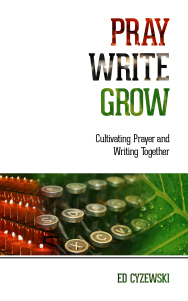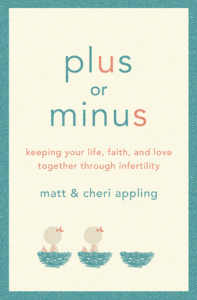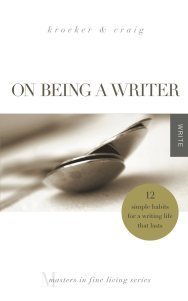Ed Cyzewski's Blog, page 25
March 11, 2015
Releasing My New Book: Growth in Prayer and Writing Starts in the Same Place
Today I’m releasing my latest book, Pray, Write, Grow: Cultivating Prayer and Writing Together. This book combines the questions: “How do I find more time to pray?” and “How can I improve as a writer?” What if you could grow in both prayer and writing at the same time? What if the time you invested in writing could help you pray, and the time you invested in prayer could help you write? Here is part of the opening chapter that begins to answer those questions:
Every time you bow your head in prayer, open up a blank document on your computer, or flip open a journal page to write, you’re taking a leap of faith. Writers choose to believe they can string together another series of sentences that will speak to the needs of readers somewhere. When people pray, they’re choosing to believe there’s a good, loving God reaching out to us, listening to our prayers, and meeting with us.
We have faith that the discipline of writing will pay off. If we keep working at it, keep practicing, keep asking for feedback, keep revising, and keep publishing our work wherever possible, we’ll get better, reach more readers, and take meaningful steps forward. If we face the most challenging and vulnerable parts of our lives, we have faith that we’ll find words that offer clarity and perspective. If we put our words in front of readers, we have faith that some will reply, “Yes! Me too!” If we take the time to continually examine ourselves and care for ourselves, we have faith that the words will continue to come together year in, year out, whatever life throws at us.
We have faith that the practices of silence, praying with scripture, or reciting the prayers passed on to us will bear fruit over time. If we continue to fight through our fears and anxieties in order to sit in silence, we trust that God can meet us, even if it leads to results we aren’t expecting or doesn’t even result in quantifiable progress.
If we continue to cultivate habits of stillness and quiet throughout the day, we have faith that God can meet us and will speak even at moments when we aren’t expecting to hear anything. If we continue to wait on God, we have faith that periods of silence don’t indicate God has abandoned us.
We can even have faith that growing in one practice could lead to growth in the other.
Every time I grow as a writer, my prayer time receives direction.
Every time I grow in my prayer time, my writing has increased clarity.
Writing and prayer stand well enough on their own, but many of the disciplines that help you write better will also help you pray better and vise versa. This wasn’t something I planned out. I never set out to find connections between the two. Rather, I spend significant parts of each day writing and praying, and at a certain point I started to notice how the two converged.
As I prayed, my writing started to shift and grow. Both the disciplines of prayer and the lessons I learned transferred over to my writing, and my writing furthered my personal reflection and helped foster the habits and disciplines I’d been cultivating while praying. When prayer and writing finally started working together in my life, I began to take significant steps forward in both simultaneously.
I suspect that both prayer and writing can offer a lot of benefits by themselves. I certainly don’t think you have to do them together. However, if you’re already inclined to both write and pray, you may as well figure out how they can help each other. And if you’re experienced in one, you may find opportunities for personal or spiritual growth by trying out the other. I would even go so far as saying it like this:
If you want to improve your prayer life, try writing.
If you want to improve your writing life, try praying.
The two require many of the same practices, disciplines, and virtues. Of course you should certainly only pray out of an interest to meet with God on a deeper level, just as you should only write if you have something to say or process. I’m not trying to tap into the commercial writing potential for prayer or to guilt the reluctant into writing. Rather, I want to drive home the point that prayer and writing not only happily co-exist, but also feed off of each other and can benefit each other.
Order your copy on Amazon for $1.99 until March 16.
(regular price $3.99)
Read the reviews at Goodreads.

March 10, 2015
Guest Post: Why We Avoid Self-Reflection… Even Though It’s Good for Us
I have the honor of guest posting today for my friend Tsh Oxenreider’s blog, The Art of Simple. If you’re new to Tsh’s blog, check out her podcast and her book about trying to live simply yet intentionally: Notes from a Blue Bike. I’m offering an adapted preview from the introduction to Pray, Write, Grow: Cultivating Prayer and Writing Together ($.99 pre-order until tomorrow!):
You don’t have to be determined to avoid self-reflection these days.
Most of us carry app-filled smart phones in our pockets to provide constant stimulation and distraction. Binge-watching shows on Netflix, social media, and even books all offer a ready escape from being alone with ourselves. Podcasts were my favorite way to avoid self-reflection until I tried going without them for a single walk.
After watching my productivity and free time slump for months thanks to the two-hour walks our son required for a morning nap (believe me, we tried everything else), I had a break-through plan. I decided to ditch my beloved podcasts and use my walks to either think of fresh writing ideas or pray.
Mind you, I love podcasts. I hardly did anything without a podcast two years ago—when all of this took place. I believed I was on the brink of a productivity explosion. I set off on my walk and promptly drove myself crazy with worry.
Read the rest at the Art of Simple!

March 9, 2015
I Limited My Time on Facebook and This Is What Happened
I have so many reasons to be on Facebook.
I live far away from most of my family and friends. Solution? Facebook.
I work in a relatively isolated profession where my colleagues are spread all over the country and even world. Solution? Facebook.
I write stuff that I’d like people to read? Partial solution? Facebook.
I like to be entertained by witty comments on current events and cultural trends. Solution? Facebook.
I often get stuck with my work and need a distraction. MAJOR PROBLEM: Facebook
It’s so easy to just check Facebook one more time… just one more time… OK, just one more time… MAJOR PROBLEM: Facebook
Despite the benefits of connecting with friends, family, and colleagues over social media, it has a way of invading my free time that should be devoted to family, house work, and, if I’m lucky, a bit of reading. Social media offers me a quick out when I hit a slow point in my day, a difficult part of a project, or a minute of free time in the evening.
I’ve already enjoyed the benefits of the SelfControl App that shuts down any sites I’ve specified for a set period of time. It’s amazing what I can get done at work once I turn on the app and have no entertainment recourses for 45 minutes.
However, the invasion of social media into my free time has been a major concern. There simply aren’t clear lines for me between work time and family time on social media. I’m always connecting with family AND promoting my work. The two are tied together. Feeling the need for stronger boundaries, I opted to set up a limited social media fast for Lent:
No social media after 5 pm on weekdays.
No social media on the weekends.
I’ve learned two really important things about myself so far during this fast.
First, I Read a Lot More.
That’s not really a shocker. Without my 5,10, or 20 minute detours into social media, I often find myself looking for something to do in the evening if I’m giving the baby a cat nap or spending a little free time on the couch. Without the siren call of Facebook, the latest Richard Rohr book added to my collection, Eager to Love, quickly shoots to the top of my list of things to do.
Second, I Complain a Lot Less
I would have told you that I’m more of a joking complainer. I’m often tongue in cheek, right? Well, no, actually. I never realized how much of social media is actually just a litany of complaints for me until I set some boundaries around myself.
These limits have helped me see the ways I’ve “wasted” my tweets and status updates with complaints.
Mind you, some complaints are warranted. If I can’t rant about my hockey teams on social media, then I don’t really know what else I can do with it. However, each time I’m tempted to complain about the baby’s failed nap, a toddler tantrum, or yet another quirky, boundary-invading person at the café, I now stop and think about what I’m about to do. More often than not, I need to either get back to work, get back to my family, or, if I’m set on complaining, shift my sights on my hockey teams.
What Happens After Lent?
I love Lent because it offers a chance to experiment and test out which areas of my life are unhealthy and unbalanced. If giving up something like social media on the weekends feels like such an enormous burden, then it sure seems like some boundaries are really needed.
A few weeks into Lent, I’m sensing that these boundaries are going to become my new normal. Not that I WANT them to be the new normal. Rather, I don’t want these social media boundaries, and that’s what tells me I need them.
What are you fasting from during Lent?
Do you have any lessons or changes to report at this point?
Don’t forget, you can now pre-order my new book Pray, Write, Grow on Amazon for $.99.
The price goes up on March 11, 2015 when it officially releases.
Read the reviews at Goodreads.

March 5, 2015
Author Matt Appling Discusses Infertility in Plus or Minus
Infertility is one of those topics that can be particularly daunting to discuss for those of us who have never been through it. That’s why I’m so grateful to host author Matt Appling here for a brief discussion of his new book that he co-authored with his wife: Plus or Minus: Keeping Your Live, Faith, and Love Together Through Infertility . Matt is a fantastic writer, and I encourage you to pick up a copy of their book at the end of the interview:
What kinds of books are out there on the market addressing infertility and what prompted you to write your own?
There are a lot of books on infertility, but as we were going through our journey and looking for encouragement, it was the gaps in the market that we thought we could try to fill. A big chunk of books are about how to cure infertility – the “self help” type of books. Eat this, don’t eat that, do these things and have a baby as quickly as possible. There was another segment of books that were more faith oriented, but again, we saw a big share of them that were saying what the medical books said, but in a spiritual way: “Say this prayer, do this thing, and God will give you a baby.” Very little of the literature is directed at men – as if men don’t really want children and are just along for the ride. If men are acknowledged, it’s often in a separate chapter.
We wanted to write a book for couples, not just women, about how to survive infertility in your faith, love and relationships. There are no guarantees with infertility, like all of life. You can buy all the self-help books, visit the best doctors, and still might not get a baby out of the deal. So we started with the question, “What does it look like to survive infertility, no matter what the result is?”
Talk about the process of writing this book with your wife.
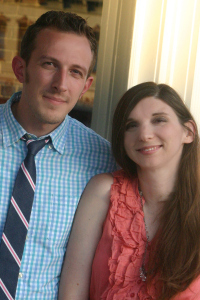 It was a process of major trepidation! When I brought up the idea with Cheri, we had to put it on the shelf for a few months so we could pray and think about it. We also knew that this book could not just be us. We asked some friends to come along with us and share their stories and wisdom. The book simply would not have existed without them. We knew that we had not done the most or suffered the longest, we just had an opportunity.
It was a process of major trepidation! When I brought up the idea with Cheri, we had to put it on the shelf for a few months so we could pray and think about it. We also knew that this book could not just be us. We asked some friends to come along with us and share their stories and wisdom. The book simply would not have existed without them. We knew that we had not done the most or suffered the longest, we just had an opportunity.
Our collaboration came in the form of discussions, which was just a continuation of the many long conversations we were having relating to our treatment. I was the principal writer, but it was a conversational back-and-forth all the time. It was certainly nerve-wracking for me – my wife can be one of my biggest encouragers and one of my toughest critics! The book ended up being about 60,000 words, but I had to trash another 15,000. Yes, my writing process is not very efficient. But the first time Cheri read the whole manuscript through, she wept the whole time for our friends who had suffered so much. It was very cathartic to work together on something so personal.
Why should couples not experiencing infertility read your book?
Some of the best words of encouragement I’ve received have been from couples who have not had this problem! We spend an entire chapter on discussing modern family life and how our idea of “family” has evolved into what it is today. Besides that, we feel that all marriages are going to suffer through some kind of season – of sickness, of financial distress, or something else, and what we gleaned from our season can be applied to other situations and help to put things into perspective.
We also hope that couples will not only be able to support their friends or the couple in church who is suffering, but that they will look at their own children a bit differently. Life is a wonderful, terribly complex thing, and our journey gave us new eyes to see that.
What are some tips for being sensitive to the needs and experiences of couples who are dealing with infertility?
The first thing you can do is to watch what you say.
Infertility is just not in our cultural vocabulary, so even when we put our feet in our mouths, we usually don’t know it. We see a childless couple and never assume that they are having problems, so we jump to questions about “When are you having kids?” and the like. We had some really personal questions directed at us by people who assumed we were just waiting for a long time.
Acting as an armchair fertility doctor is never really helpful either, so tips like “just relax,” are not necessary. Just express that you are praying for your friends, and then find some other topic of conversation other than your own children! Many of us can be okay around our friends with children, but try to have conversations about something besides the kids.
Just to illustrate that people don’t know what to say about infertility: a couple of months ago I was at an authors’ event and the very first person to approach my table had a child clinging to her leg. I told her about my book, which was upcoming at the time, and she said, “Pffft…I wish I was infertile.” My jaw dropped and I may have laughed a little to ease the tension, because that’s what I do, even when other people are offensive. But she never caught herself or realized how wildly inappropriate that was. I should have referred her to a doctor who could help with her problem!
This book is quite a departure from your previous book on creativity. Tell us a bit about that book in case folks aren’t familiar with it.
Life After Art was my first book with Moody Publishers. I drew from my experiences as an Art teacher in rediscovering creativity as a source of spirituality. I am still teaching Art, still loving it, and still rediscovering every day the things I wrote on those pages. It’s a book that’s even more for the adult who doesn’t feel they are creative, who had teachers who told them that Art wasn’t “their thing,” the adult who feels stuck in life or work and just doesn’t know why. We all are made to be creative – it’s just a matter of finding out how.
Thanks Matt and Cheri for this extremely important book!
Learn more about Plus or Minus.

March 4, 2015
Rohr for Writers: Sacrifice and the Trap of Unmet Expectations
I didn’t know there was a wrong to way to make a sacrifice. Shouldn’t the act be enough by itself?
Back in college I went out of my way to help a friend. I mean, I took the better part of my day to help him out. Huge, huge sacrifice! Epic! Look at how much I care for you!
He didn’t respond with much gratitude if any, and I just about lost it. The nerve! How dare he! I spent my day helping you, and you can’t even say thank you?
Richard Rohr has something to say about all of this, and it’s especially timely for my writing work:
“’Sacrifice’ usually leads to a well-hidden sense of entitlement and perpetuates the vicious cycle of merit, a mind-set that leads most of us to assume that we are more deserving than others because of what we have given or done. As the old saying goes, all expectations and self-sacrifice are just resentments waiting to happen.”
Immortal Diamond pg. 47
While most writers struggle with comparing ourselves to others, there’s another subtle trap that we can all fall into: the trap of resentment.
Writing requires sacrifices and commitments that can prove costly, and we can begin to expect a return that is in keeping with what we have given up. As we place a premium on our time, effort, and expertise, we can begin to resent the signs that our “investments” in writing aren’t bringing the proper “returns.”
If only “those people” would notice our sacrifices!
I write in Pray, Write, Grow that I had to learn that my writing is a gift to others. A gift isn’t a transaction. While some of us in a more affluent culture have certainly turned gift-giving into quid pro quo transaction where a gift given must equal the gift received, the nature of a true gift removes any hint of expecting anything in return.
That’s what makes writing so taxing sometimes. We could spend hours, days, and months honing a piece of writing only to see it sink into obscurity. Our audience owes of nothing. Sometimes the gift is well-received and sometimes it remains largely “unopened.”
I’ve been there. Heck, I’ve LIVED there for months at a time. There’s been no greater challenge than watching a book I’ve labored over fizzle as readers see it, shrug, and walk away.
Anything we do for others can become a resentment trap if it has called for sacrifices. We can begin thinking, “I had to give up so much for you! The least you could do is appreciate it on my terms!”
The moment we fall into the resentment trap, we turn a “gift” into a transaction, even if we’re not expecting something tangible in return. We’ve made a particular response or affirmation part of the exchange.
At the root of all this, we return to the core issue of identity. Where do you find your identity? Do you let God define who you are and what you’re worth? Do you let your work or other people determine your value?
Most writers I know hate editing, but what really breaks us is the publicity and marketing process—the moment when we put our finished work in front of readers and pray that some read it, enjoy it, and, hopefully, share it with others.
Letting go of my hopes and expectations for my writing has been excruciating. It feels like I’m giving up or at least setting my sites ridiculously low.
Letting go of my hopes and expectations for my writing has also been liberating. I just have to be faithful. I have to write where I feel led. And if I’m only going to base my success on faithfulness, then I’m only more motivated to make sure my work lines up with God’s direction for my life.
Can you see how that works?
If I’m only writing out of a sense of faithfulness to God, then I better sort out God’s direction first.
Without that direction, my work is a complete waste of time. If I’m not looking for anyone else’s approval or applause, I need to at least make sure the starting point is solid. If praise and applause follow, that’s nice, but it’s not the foundation or the driving force behind what I write.
May we learn how to make sacrifices without falling into the trap of resentment.
May we find the freedom and joy of giving our creative work to others as a true gift.
About This Series
Rohr for Writers is a new blog series at www.edcyzewski.com that is based on the ways Richard Rohr’s writing speaks to writers. We’re going to spend the first few weeks looking at key quotes from Immortal Diamond.
Learn More about Prayer and Writing
You can grow in both your prayer and writing by developing the same practices. Check out my new book Pray, Write, Grow: Cultivating Prayer and Writing Together to learn simple exercises you can incorporate into your day right now.
Pre-Order it until March 10 for $.99!

February 27, 2015
Denomination Derby: Why You Should Join the Nazarenes
When it comes to this small, tightly-knit branch of the holiness movement, I’ve found that my friend Zack Hunt cares a great deal for his life-long denomination–enough to ask for several writing extensions lest he leave anything out. In the time that I’ve known Zack, he has consistently praised the Nazarenes for what they get right and quickly recognized what needs work. The fact that he remains so passionate about this tribe after all of these years is a good reason to read on.
I’ve been a Nazarene for longer than I can remember.
Literally.
Except for a few years on loan as a youth pastor in the United Methodist Church, I’ve been a Nazarene since birth. And so has most of my family. Not long after the denomination was founded on the dusty plains of Pilot Point, TX in 1908, my great-grandfather Rufus left his small Methodist church in Blountstown, FL and became a Nazarene. His exodus wasn’t a rejection of Methodism, but an embrace of the American Holiness Movement, which sought to recapture and revive the biblical call to holiness.
As a product of the Holiness Movement, the Church of the Nazarene began in the hearts and minds of Methodist and other holiness minded ministers who believed that Methodism had neglected its distinctive emphasis on the call to holiness; a call which, in the eyes of John Wesley, was foundational not only to Methodism, but the Christian life in general. That perceived neglect, combined with disagreements over various social issues led these holiness minded ministers to bring their various congregations together to create the Church of the Nazarene in hopes of renewing the Church’s passion for holiness.
Though it was very much a group effort, one man in particular is often regarded as our founder, Phineas F. Bresee. Not only did he start the first congregation with the name “Church of the Nazarene” in Los Angeles in 1895, it was, in large part, his vision that helped shape the early mission of the Nazarene Church, specifically its focus on the poor. Serving the poor was critical to Bresee’s understanding of holiness, and he never missed a chance to remind his Nazarene brothers and sisters that “the poorest of the poor are entitled to a front seat at the Church of the Nazarene.” Needless to say, I’m a pretty big fan of our founder and it is because of that loving-the-least-of-these-understanding of holiness that I remain a Nazarene today.
But enough with the history lesson…
What do Nazarenes actually believe?
Well, contrary to any urban legends you may have heard, we don’t handle snakes. But, theologically, we are a bit quirky. I say that because while I think most outsiders and even a lot of folks within the Church of the Nazarene would consider us to be a pretty conservative lot due to our stances on various social issues, many of our other theological positions are, comparatively speaking, fairly progressive.
Now, it’s true that historically, Nazarenes didn’t drink, go the movies, play cards, or even dance. But while grape juice is still our beverage of choice at the communion table, these days, you’ll almost certainly find yourself sitting next to a Nazarene at the movie theater and you’ll probably play Uno with a Nazarene and never realize it. But you’ll definitely know when you’re dancing next to a Nazarene ‘cause we’ll be those awkward folks on the dance floor who clearly have no idea what they’re doing. Look, we’ve only been dancing for a few years now, cut us some slack.
But like I said, in contrast to some of our social stances, we’ve got several other theological convictions that don’t fit so neatly into the cliché conservative evangelical mold. For example, we’ve proudly ordained women since the founding of our denomination. While we certainly affirm that God is the ultimate creator of the universe, we don’t really care how you choose to believe God did the creating. In other words, we’re ok with evolution. And when it comes to the Bible, we don’t affirm the total inerrancy of scripture. Though we do believe the Bible does a perfectly good job of revealing all things necessary for our salvation, if you find a historical, scientific, or some other kind of similar error in the Bible, that doesn’t really bother us because we don’t believe the Bible was created to be a textbook.
That’s not to say the Bible doesn’t play a fundamental role in our tradition. It absolutely does. And so does the theology of John Wesley. It is through the lens of our theological forefather that we read the Bible and in doing so we find ourselves confronted with an inescapable call to holiness. As we interpret it, the call to holiness means that, as Christians, we aren’t simply called to be saved, but rather to go further and model our lives as best as possible after that carpenter from Nazareth who gives us our name. That call that gave birth to our denomination, and that call continues to unite the Church of the Nazarene today.
Now, I have to be honest with you. As much as holiness unites us, what it means to be holy and how one becomes holy (especially how quickly one becomes holy, if at all in this life) is a matter of great debate in the Church of the Nazarene. Unfortunately, some folks’ understanding of holiness has led to legalism. But at its best, holiness has been defined by folks like our founder Phineas Bresee who declared that the mission of the Church of the Nazarene is “not great and elegant buildings; but to feed the hungry and clothe the naked and wipe away the tears of sorrowing, and gather jewels for His diadem.” In other words, for those of us in the Nazarene Church who follow in our founder’s footsteps, we believe that holiness is not found primarily in a list of do’s and don’ts, but in loving and caring for the least of these.
So, what is a worship service like in the Church of the Nazarene?
Our style of worship is pretty diverse. Depending on what Nazarene Church you’re visiting and what part of the world you find yourself in, the worship might be more on the traditional side with hymns and a little gospel music mixed in for good measure. Or the service might be extremely contemporary with more Hillsong music than this guy can handle. You might even find yourself in a Nazarene church that’s really sacramental and feels almost, not quite, but a little bit like a high church service. And if you’re really lucky – and it’s summer time – you might just end up in a good old-fashioned camp meeting revival.
Personally, I love our diversity of worship styles. I think it reflects the big tent spirit of our church that you can also see in some of the statements of faith I mentioned before. But what I really love, and what I think what a lot of my fellow Nazarenes love about the Church of the Nazarene is the sense of family we have whenever and wherever Nazarenes get together.
You see, we’re not a terribly large denomination. There are a little over two million Nazarenes in the world today, with more of us living outside the United States than within. But that relatively small size creates a wonderful sense of family. It doesn’t matter where you are or who you’re talking to; if you meet another Nazarene it’s just about guaranteed that within 5 minutes you’ll discover you both know some of the same people – or that you actually know each other somehow and just didn’t realize it. For example, when my wife and I were looking for a new church home after we moved to Connecticut, we naturally decided to visit one of the local Nazarene churches. All we really knew about the church was that it was Nazarene, and it was in Connecticut. As it turned out, after talking to the pastor we discovered not only that he was the one who had rushed my wife to the hospital at church camp when she was in middle school, but he was also her stepdad’s roommate in college.
Like I said, it’s a small Nazarene world.
But I love that about the Nazarene church because it means even when you move halfway across the country, you can walk into a Nazarene church you’ve never set foot in before and yet somehow it still feels a bit like coming home.
Now, at this point, I know what you’re thinking, “Wow, you guys sound awesome! You love the poor, you empower women, and if I get hurt at church camp I can count on my future pastor to rush me to the hospital. It’s almost too good to be true! How do I sign up??”
Well, I wish I could tell you that we’re as perfect and wonderful as I make us sound. But I would be lying to you if I said we always live up to the Christian perfection we preach about. There are corners of our church that are still plagued by legalism. While we’ve always ordained women in the Church of the Nazarene, we don’t always do such a great job of finding them churches to pastor. We’ve got a lot of work to do in regards to our relationship with the LGBT community. And even the familiarity and sense of family aspect I love so much, can be problematic when they result in positions of leadership being perpetually filled by the same biologically related families with familiar last names, thus stifling the critical infusion of fresh perspectives and new ideas that every church needs.
In other words, we’ve been around for more than a century, but we’ve still got a lot of work to do.
And yet, in spite of our flaws, I am still deeply proud to call myself a Nazarene. I believe in Bresee’s vision of a church dedicated to serving the poor. I believe the call to holiness is as relevant today as it was a hundred years ago. And I am incredibly grateful for a church family that has shaped my faith in profound ways and helped me become the person I am today.
About Today’s Guest Blogger
 Zack Hunt is an ordained elder in the Church of the Nazarene and graduate of Trevecca Nazarene University. He blogs at
ZackHunt.net
. You can follow him on Twitter at
@zaackhunt
and keep up with his blog through
his Facebook page
.
Zack Hunt is an ordained elder in the Church of the Nazarene and graduate of Trevecca Nazarene University. He blogs at
ZackHunt.net
. You can follow him on Twitter at
@zaackhunt
and keep up with his blog through
his Facebook page
.
About Denomination Derby
This series invites ministers or volunteers with seminary training to share what they love about their denominations so that readers will have a greater awareness of and appreciation for the good things happening throughout their denominations. We’re also accepting posts where anyone can share what they love about their denomination. Search for more posts in the series by clicking on the “church” category.
We have several writers lined up to write about their respective denominations, but nominations for guest bloggers or requests for a particular denomination are welcome.
Subscribe to my RSS email list to make sure you get the posts each Friday as they go live.

February 25, 2015
Rohr for Writers: Above All Else, Avoid Success
How many times have I rejected God’s mercy because it came clothed in failure and disappointment?
No one signs up for an exciting new career or work opportunity with the goal of utterly and completely failing. And yet, how many of us have fallen flat on our faces at one time or another?
In my writing I’ve experienced a roller coaster of encouragement and discouragement. Each day is a new adventure in measuring incremental success and trying to reach just a few more readers than the day before.
While working to attract readers, writers are especially at the mercy of others in order to achieve success. If people aren’t interested in our work, then we may as well scribble notes on paper and fold them into paper airplanes. If influential people above us don’t offer guidance, endorsements, and marketing help, we’ll most likely flounder.
It’s hard to see the mercy in failure. When you’re on the outside looking in at those who are enjoying success, it sure seems like the successful figures in the writing world are living the dream, writing books in trendy cafes (mine is full of broken chairs and dust), and talking about their ideas for adoring audiences. We don’t see the inherent drawbacks in success.
Richard Rohr clues us in:
“A too early or too successful self becomes a total life agenda, occasionally for good but more often for ill… Our ongoing curiosity about our True Self seems to lessen if we settle into any ‘successful’ role. We have then allowed others to define us from the outside, although we do not realize it.”
Immortal Diamond, pg 27-28
Mind you, that isn’t to say that every successful writer, especially those who are young, are inherently captive to the demands of his/her audience. Rather, they are the ones who face the greatest challenges when trying to hold onto a clear sense of their true selves when there are so many temptations to seek validation elsewhere. They are the most likely to make a habit of measuring themselves according to the standards of others.
More to our point here, every successful writer I’ve talked to is quick to point out the drawbacks. They are targets for criticism, endure crazy scrutiny in the public eye, and often wonder which new friendships are genuine and which are just trying to take advantage of their success. It’s not all about living the dream each and every day, even if they can afford better coffee than the average writer.
If anything, my successful friends have humbly reminded me that just reaching a point of achievement in your career can be tremendously unfulfilling. At the very least, success can be a fragile thing that is sure to fade at one point. And when it does fade, we are left wondering what remains.
Rohr makes his case in stronger language when he goes on to quote Thomas Merton on pg 28:
“‘Be anything you like, be madmen… and bastards of every shape and form, but at all costs avoid one thing: success. If you are too obsessed with success, you will forget to live. If you have learned only to how to be a success, your life has probably been wasted.’ Success is hardly ever your True Self, only your early window dressing. It gives you some momentum for the journey, but it is never the real goal.”
Reading this, I’m well aware that it’s perfectly reasonable to say that Merton was “successful” as a monk and as a writer. We’re still talking about him, aren’t we? That sounds pretty successful to me.
So, if anything, I’m encouraged to read Rohr and Merton’s words on success. Writers can achieve success for a season while still remembering that it is fleeting and ultimately a poor substitute for recognizing our identity as God’s beloved people. The great trap of success is that once people start to notice us, they will begin to try to define us and will most certainly judge us, and we’ll be tempted to give their words tremendous power—even drowning out what God says about us.
Think about that for a minute.
If you’re going to write, you’re going to receive feedback on social media, comments, reviews, emails, and (the introvert’s nightmare) phone calls based on your work. You’re going to see people leave one or two star reviews along with comments like, “Didn’t speak to me.” You’re going to have your faith, integrity, and intelligence questioned.
By the same token, you could be told that you’re brilliant and amazing. You could be told that you’re the hope for the future—the person who could save the church or at least a segment of the church. You’re going to be praised and honored for your achievements.
The crazy thing, according to Rohr and Merton, is this: Praise can be more threatening to our spiritual health than criticism. While negative reviews or insults can be deeply wounding, we can at least see what they are and take steps toward counseling and healing.
There is no ready balm for the damage done by success. Who would think of going into counseling to counteract the negative side of success? We may even tell such a person to stop being ridiculous.
Rohr and Merton remind us that success can exert tremendous power over us, trying to define who we are and what we are worth. If we can’t counteract our steps toward success with the grounding knowledge of God’s love and acceptance, then we are better off having failed in the first place.
There is great mercy in failure. Failure is an opportunity to step into our true selves, as loved and even praised by God as his beautiful creations, even when we don’t receive praise at the times and places of our choosing.
Learn More about Prayer and Writing
Check out my new book Pray, Write, Grow: Cultivating Prayer and Writing Together to learn simple spirituality and creativity practices you can incorporate into your day right now. It’s $.99 on pre-order until March 11th when it releases.
About This Series
Rohr for Writers is a new blog series at www.edcyzewski.com that is based on the ways Richard Rohr’s writing speaks to writers. We’re going to spend the first few weeks looking at key quotes from Immortal Diamond. Click on the Prayer category to read other posts in the series.
February 23, 2015
Rohr for Writers: Stop Calling Yourself a Writer-You Are Loved
What is your identity? Do you call yourself a writer? I would say that you can write, but you are loved by God first.
Your identity should never hinge on something that you have to do. Your identity should rest on what you have already been given, what no one can take away, and what is perfect and irrefutably true.
Richard Rohr writes in Immortal Diamond:
“Your True Self is who you are, and always have been in God . . . The great surprise and irony is that ‘you,’ or who you think you are, have nothing to do with its original creation or its demise. It’s sort of disempowering and utterly empowering at the same time, isn’t it? All you can do is nurture it.”
Before you put your first word on the page, you have a very important question to answer: How do I determine my self worth?
In other words…
Does your identity hinge on the response of others to your writing?
Will you feel more secure about yourself if readers respond positively?
Will you consider giving up if you don’t reach a certain goal with your writing?
So many struggle with calling themselves “writers” because it’s a murky label. Do you need to write for a certain number of people in order to call yourself a writer? Do you need to attain a certain level of success before you can claim that label? Don’t ask me if I know.
Regardless of whether you think you can call yourself a writer, I wonder if Rohr can help us move beyond these labels and consider ourselves on a deeper level. What if our primary identity is linked to what God says about us? If writing is just something we do, something important that some do more professionally than others, then the words we write or the response of readers cannot change us.
Semantically, we can still refer to ourselves as writers, but it may be helpful to remember that writing is something we do. It’s just a small piece of who we are, even if we devote significant hours to it each week. Even speaking of myself, one who pays the bills through writing each day, I have found it extremely toxic to hinge my identity on my writing.
When I centered my identity around being a writer, I endured the misery of setting goals for myself, failing to meet them, and then enduring the doubts and questions that followed. If I didn’t meet my writing goals, what kind of writer could I consider myself? And if I wasn’t much of a writer, who am I after all? Could I claim any kind of identity?
Constantly maintaining my identity as a writer drained away my joy, prompted me to spend less time with my family, and created a deep aching that drummed away in my mind. My stress and anxiety sky-rocketed.
Something had to give, and Rohr’s Immortal Diamond spoke directly to the heart of my struggle with writing: my identity was based in large part on calling myself a writer.
When I finally let go of the goals I’d attached to my identity as a writer, admitted failure in a few areas, backed off on what wasn’t working, and committed myself to what seemed more sustainable, I felt like a massive burden had been removed from my shoulders.
I had more energy to devote to my family and even to myself, to say nothing of more free time.
My identity isn’t linked to my writing—at least most days. Writing is my work, my calling, and my ministry. It’s not who I am. There are days when I still struggle to maintain those lines. When they start to blur, I can let too much rest on how others respond to my writing—even the most minuscule social media praise or criticism can swing my day one way or the other. That’s typically a sign that something is out of balance.
Rohr writes that nothing can touch you when you find your identity in God’s love. I find that both immensely appealing and extremely difficult to believe.
Nothing? Really?
While I will surely feel pain, suffering, disappointment, and regret when I rest in my identity as beloved by God, the stakes attached to my writing work are now completely different. I’m still disappointed if people don’t like my work, but it’s not the same kind of dread and devastation. I don’t feel the same need to keep fighting and struggling and working.
My drive is now completely different when I get my identity sorted out before writing. I am free to work hard and to put out my best work, but there is so much less riding on the success of my work. I’m in a much better position to accept criticism and failure. Best yet, if things don’t work out, I can just try something else.
I don’t see this identity in God as a card you receive and carry with unwavering assurance every day. It’s not like you either have it or you don’t. I see it as more of a continuum. While I experienced a freeing epiphany while reading Immortal Diamond, I don’t see myself completely in the clear at this point.
As you begin writing today, this week, next month, or next year, the first thing you need to know is that you are loved by God—period. You are loved and pursued because there aren’t any footnotes, endnotes, or “syke!” comments in John 3:16. God so loved the world, and if you’re part of the world right now, then that includes you.
Jesus spoke of himself as the vine, and we’re the branches attached to that vine. So if you want to know more about who you are as a branch, the only way to look is back to the vine itself. We can’t do anything to change the vine, and so we can rest in that security and stability.
It will be an ongoing learning process. I doubt I’ll ever be done. However, the crazy thing about finding my identity in God’s love is that I’m now free to enjoy writing for what it is. It’s like writing occupies its own cozy little corner in my life. I want to excel as a writer, but my identity isn’t wrapped up in it.
I’m learning how to be free to write because I’m learning how to receive the freedom of God’s love.
About This Series
Rohr for Writers is a new blog series at www.edcyzewski.com that is based on the ways Richard Rohr’s writing speaks to writers. We’re going to spend the first few weeks looking at key quotes from Immortal Diamond.
Learn More about Prayer and Writing
You can grow in both your prayer and writing by developing the same practices. Check out my new book Pray, Write, Grow: Cultivating Prayer and Writing Together to learn simple practices you can incorporate into your day right now.

February 19, 2015
How to Market a Book with Integrity: A Christian Author’s Struggle
My friend Charity Singleton Craig is guest posting today about the lessons she and co-author Ann Kroeker learned as they released their latest book On Being a Writer. In particular, she shares how they tried to make the marketing process less miserable—even fun at times. If Ann and Charity can’t make book marketing fun, I don’t know who can!
I’ve never been part of a publishing industry that comes knocking on writers’ doors with large advance checks and the opportunity to just be our introverted selves and write. Never once has someone told me, “You just focus on the words; someone else will worry about the sales.” In fact, conventional wisdom tells us just the opposite. Make sure the writing is decent, but your marketing strategy and platform need to be excellent.
And you’d think that would be fine by me since in addition to being a writer, I also provide marketing services to clients. I have no problem giving them the tools they need to explain their services and connect with potential customers.
When it comes to selling myself, though—which is really what an author needs to do if she plans to write more than one book—the whole business seems a little slimy. I don’t know any writers who think or feel any differently, but if participating in a sales strategy is a necessary part of the writing life, then I needed to get okay with it. And fast.
As my co-author, Ann Kroeker, and I wrote and released our recent book, On Being a Writer, five key elements emerged that have allowed me to sell books without losing my soul.
1. Permission to be myself.
From very early on as we brainstormed ways to spread the word about our book, our publisher, L.L. Barkat, encouraged both Ann and me to choose marketing activities that would allow us to be ourselves. Organizing a big launch team? That didn’t feel like “us.” So instead, we contacted a few individuals privately to help with specific tasks. We also hosted small in-person, launch parties so our friends could come and buy books and celebrate with us. We don’t all have the same gifts and skills—the Apostle Paul reminds the Corinthians of that extensively in his letters to them. In the same way, we can’t all approach book selling the same. That’s not to say that I should never operate outside of my comfort zone. But finding marketing methods that fit best with my personality and desires will ultimately serve the book, the readers, and myself best.
2. Focus on relationships.
When readers become a platform and friends become a strategy, it’s easy to forget that these are people I am building relationships with. Focusing only on what others can do for me is not only a self-centered sales technique, it misses completely the way the Bible says we should love people. Though Scripture is certainly more than a relationship manual, it provides many guidelines for how we as writers should be interacting with readers, publishers, fellow writers, and more. Here are just a few: James warns against favoritism or giving preference to those who are influential or wealthy. Paul exhorts us away from selfish ambition, thinking only of our interests, toward looking out for the interest of others. Peter reminds us that love should be sincere. And Jesus tells us to give straight answers, to let our yes be yes and our no be no.
3. Let each project motivate me.
In On Being a Writer, Ann makes a strong point about what should motivate us to promote our books or other writing projects. It’s advice she actually got from the publisher of one of her earlier books. “Something compelled you to write this message and share it with a broader audience. Right?” her publisher asked. “Could you see speaking [or other promotional efforts] as another avenue to share that same message?” Later in the chapter Ann talks about going on the road to promote that earlier project: “Each time, I kept that idea in mind: the message matters, and I want to get it to the people who need to hear it.” If you just want to write for your own self-discovery or private reflection, keep a journal. But if you have a message or a story or a strategy you want to share with others, publish a book, and then let that message guide you toward telling people about it.
4. Remembering that I am creative.
Not only do we each have unique, God-given gifts, we also are made in His image as creators. Just as we bring all of that creativity to the work of writing books, we can employ it in selling books, too. Don’t use just the strategies everyone else is using because “that’s the way we do things around here.” Try new things. Take creative risks. Let your personality, your relationships, your book itself guide you in new and interesting ways to spread the word. For Ann and me, that came in the form of an early release of our book, a surprise even to us as authors! Without telling us, our publisher released our book several weeks early. Sales were happening, friends were gathering, and Ann and I were nearly the last ones to know! That creative launch gave our early sales a boost, and we had nothing to do with it!
5. Finally, have fun.
After the hilarity of that early release, suddenly Ann and I had a lot of work to do to get the word out beyond our immediate circles. We ratcheted up the intensity, and rather than enjoying the conversations and being thankful for our bit of success, our strategy turned serious. For several weeks, I didn’t have much fun. People would ask how the launch was going, and I’d smile and say, “Great!” But secretly I was wondering whether I really was cut out for the writing life. After a break from the book over the holidays, I came back to our efforts realizing that it was just the intense, serious version of the writing life that isn’t for me. But by injecting a little fun into our marketing campaigns, I can still be focused without nearly as much stress.
Author Neil Gaiman tells the story of some advice he received from best-selling horror writer Stephen King fairly early in his career. When King observed Gaiman’s early success, he told him simply: “This is really great. You should enjoy it.” The thing is, Gaiman wasn’t enjoying it. And he didn’t for a while.
“Best advice I got that I ignored,” Gaiman said. “Instead I worried about it. I worried about the next deadline, the next idea, the next story. There wasn’t a moment for the next fourteen or fifteen years that I wasn’t writing something in my head, or wondering about it. And I didn’t stop and look around and go, this is really fun. I wish I’d enjoyed it more.”
Being part of a sales strategy is now a reality for writers. But it doesn’t have to suck the life out of you in the process. How do you keep your soul while selling books?
Learn more about On Being a Writer: Ten Simple Habits for a Writing Life That Lasts.
About Today’s Guest Blogger
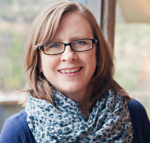 Charity Singleton Craig is a writer, bringing words to life through essays, stories, blog posts, and books. She is the coauthor of On Being a Writer (T.S. Poetry Press, October 2014), and she has contributed essays to three books, including Letters to Me: Conversations with a Younger Self. She is regularly published at various venues, including The Curator, where she is a staff writer; The High Calling, where she is a content and copy editor; and TweetSpeak Poetry, where she is a contributing writer. She lives with her husband and three step-sons in central Indiana. You can find her online at charitysingletoncraig.com, on Twitter @charityscraig, and on Facebook.
Charity Singleton Craig is a writer, bringing words to life through essays, stories, blog posts, and books. She is the coauthor of On Being a Writer (T.S. Poetry Press, October 2014), and she has contributed essays to three books, including Letters to Me: Conversations with a Younger Self. She is regularly published at various venues, including The Curator, where she is a staff writer; The High Calling, where she is a content and copy editor; and TweetSpeak Poetry, where she is a contributing writer. She lives with her husband and three step-sons in central Indiana. You can find her online at charitysingletoncraig.com, on Twitter @charityscraig, and on Facebook.
One last note from Ed:
By the way, my latest eBook, Pray, Write, Grow: Cultivating Prayer and Writing Together (due out March 11th), is available for pre-order at the steep discount of $.99 on Kindle.
Click the cover image below to place your order before the price goes up!

February 13, 2015
Denomination Derby: Why You Should Join the Disciples of Christ
I know a surprising number of people in the Disciples of Christ denomination these days, especially considering that I hadn’t heard of it until I read the fantastic memoir Any Day a Beautiful Change by Katherine Willis Pershey a few years ago. I love how the Disciples of Christ folks I know are both committed Jesus-followers while also being incredibly diverse and generous. It’s a hard group to pin down in a single blog post, but Rev. Erin Wathen does a great job sharing what she loves about her denomination:
It pays to have a great conversion story. Some fantastic burning bush moment when God turned your doubt upside down with unavoidable, cosmic certainty; or a drawn-back-from-the-brink story, wherein you abandoned a life of crime/addiction/certain doom for—wait for it—Jesus! If you’re a pastor and you have THAT story, then every sermon for the rest of your life has found its starting point, its center, and/or its conclusion…with your own story.
Too bad I don’t have that story. My story goes more like this: I grew up in a mainline protestant church in small town America. I did Sunday school, vacation Bible school, church camp, mission trips, and youth group, without complaint or resentment. Then I went to college and felt no impulse, whatsoever, to go to church on the weekends. When I got out of college, I started going to church again—different town, same denomination. And like, 5 minutes later, I found myself in seminary classes going, ‘what the hell…?’ I mean, I loved church. I had always loved church. But how it got me on the hook for life, I’ll never know. Maybe it was the Bible school cookies? Or the Pension Fund. Whatever it was, it was no flaming conversion.
The church of my raising was the Christian Church, Disciples of Christ, and that’s where I’ve served a decade-plus of ordained ministry. The Disciples grew out of the Stone Campbell movement in the early 1800’s. The early founders sought an alternative to the divisive denominationalism of that time. They wanted a way to live faith in community without “tests of fellowship,” and with “no creed but Christ.” It was a frontier journey, in more ways than one. Most literally, it was a fellowship that grew out of rural, Central Kentucky—which was the very edge of all that lie ‘west’ of civilized America. But it was also a wilderness outside of polity and strict doctrine. This was to be a place where all were welcome to receive communion; all would be received in baptism; and all could worship together, even if they did not entirely agree on the letter of the law.
How we measure the success of that original movement, these days, is highly subjective. On the one-hand, 200 years of shifting social paradigms have led to several splits. What started as a single, unified church is now 3 different denominations; sometimes we’re speaking to each other, sometimes not. Depends on the day (and what part of the country you’re in). At the same time, the Disciples of Christ, on the whole, can still point to those founding tenets of unity in Christ and freedom of belief at the heart of who we are as church together.
But with all that freedom comes the occasional identity crisis. And what, really, has been a centuries-long marketing nightmare.
“What does your church believe?” a newcomer might ask. “Well…” we venture… “Depends on who you’re talking to. And where you are on the map. And who made the coffee this morning, among other things.”
Most of our congregations affirm and empower women for leadership; but a few still don’t. Some are welcoming of LGBT people; some aren’t. Some embrace a progressive understanding of scripture; but not all. Some of our churches use gender-inclusive language for God, avoid violent imagery of crosses and blood, and are comfortable hearing about social issues from the pulpit. Others… you see where I’m going with this.
When everybody is welcome, doubt is affirmed, questions are encouraged and nobody wants to tell anybody else what to believe… then what in the world do you put on the brochure?? The website? The t-shirt?
True to those ideals of our founders, authority lies within the local congregation. We handle our own money, own our property, hire (and fire) our pastors, select our own leaders, and are not bound by the demands of any hierarchy. Our mission is expressed from the ‘bottom up,’ in that churches support the larger structure for ministry—and not the other way around. That means the local church can hone its own mission statement, set its own vision, find its own way to serve and establish presence in the community… We are guided by the same basic principles, but not bound by them.
It is both wonderful and maddening, all this freedom.
It means we don’t always know how to sit together when we disagree. It means we struggle to navigate the racial tensions, present in the world outside our walls, when we come together within. It means we don’t always know how to share our message ‘out’ there, when we can’t always get it together ‘in’ here. It means it can be hard to focus our energy and our resources to affect real change in the world… when everybody’s idea of ‘change’ is broadly varied, but deeply valued.
Oh, and worship music. Don’t get me started.
The current Disciples identity statement says that “we are a movement for wholeness in a fragmented world.” And the world, as we know it, is indeed fragmented. It is complicated. And the not having of easy answers is, yes, a marketing problem. Because easy answers, proven growth models, and colorful packaged programming is what most folks are in the market for.
Disciples really suck at all that. We always have.
But what we do offer—and always have—is a safe place to live with all that ambiguity. A place where people worship together (however imperfectly) and try to organize for good. A place where ‘movement’ of the collective body, and the Spirit, are valued over any statement of faith; and where the communion table, at the center of worship and community, calls us back to a shared belief in Christ’s love: embodied within us, and made flesh for the world.
My own faith story was no flaming conversion… But it was a slow, steady certainty that I belonged at that table. At the center of everything, I had a place, and I had people. And for all that we embody different expressions of faith; for all the places I have moved; and for all the turns our collective journey has taken; that table, and the people around it, are the same wherever you go.
Put that on the brochure. It’s the best thing we’ve got.
About Today’s Guest Blogger
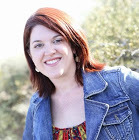 Rev. Erin Wathen is the Senior Pastor of Saint Andrew Christian Church, Disciples of Christ, in the Kansas City area. She is originally from Kentucky, and also served a church in Phoenix, Arizona for 7 years. She and her husband, Jeremy, have two kids, ages 4 and 6. Erin blogs for the Patheos interfaith network. Read more at http://www.patheos.com/blogs/irreverin/
Rev. Erin Wathen is the Senior Pastor of Saint Andrew Christian Church, Disciples of Christ, in the Kansas City area. She is originally from Kentucky, and also served a church in Phoenix, Arizona for 7 years. She and her husband, Jeremy, have two kids, ages 4 and 6. Erin blogs for the Patheos interfaith network. Read more at http://www.patheos.com/blogs/irreverin/
About Denomination Derby
This series invites ministers or volunteers with seminary training to share what they love about their denominations so that readers will have a greater awareness of and appreciation for the good things happening throughout the church. We’re also accepting posts where anyone can share what they love about their denomination. Search for more posts in the series by clicking on the “church” category.
We have several writers lined up to write about their respective denominations, but nominations for guest bloggers or requests for a particular denomination are welcome.
Subscribe to my RSS email list to make sure you get the posts each Friday as they go live.


